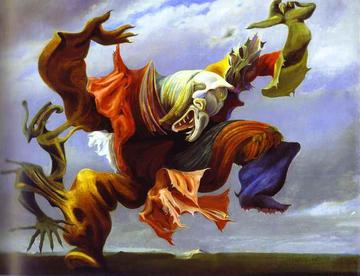Here's your Today in History -
It's that cruel month - April mixing memory with tax payments. April was the second month in an early Roman calendar, but became the fourth when the ancient Romans started using January as the first month. The Romans called the month Aprilis. It may come from a word meaning 'to open', or it may come from Aphrodite, the Greek name for the goddess of love or it may come from the word meaning 'month that used to be second but now is fourth'.
Small animals that hibernate are usually coming out of their burrows in April. The birds fly back northward or they settle down to have their families. Small people usually fly northwards from Miami to spend the holidays with their mishpocha. The bees and butterflies begin to gather nectar from the first flowers of the season.
In some parts of the world, it's planting time. In other parts, it's the harvest season. And yet in other places, it's the sanity that follows March Madness. Professional baseball begins in April. Then the amateur athletes begin to go outside in the warm weather. Spring cleaning starts and people start mowing their yards again.
Special days celebrated in April begin with the first day of April, when children and grown-ups play jokes on one another. Arbor Day is a day for planting trees, and it is observed on various April days. The Jewish festival of Pescah (Passover) is celebrated early in April. Easter is almost always in April, and, with it comes other Christian celebrations such as Palm Sunday, Maundy Thursday,and Good Friday.
Unlike most of the other nonfoolish holidays, the history of April Fool's Day, sometimes called All Fool's Day, is not totally clear. There really wasn't a "first April Fool's Day" that can be pinpointed on the calendar. Some believe it sort of evolved simultaneously in several cultures at the same time, from celebrations involving the first day of spring.
The closest point in time that can be identified as the beginning of this tradition was in 1582, in France. Prior to that year, the new year was celebrated for eight days, beginning on March 25. The celebration culminated on April 1. With the reform of the calendar under Charles IX, the Gregorian Calendar was introduced, and New Year's Day was moved to January 1.
However, communications being what they were in the days when news traveled by foot, many people did not receive the news for several years. Others, the more obstinate crowd, refused to accept the new calendar and continued to celebrate the new year on April 1. These backward folk were labeled as "fools" by the general populace. They were subject to some ridicule, and were often sent on "fools errands" or were made the butt of other practical jokes.
This harassment evolved, over time, into a tradition of prank-playing on the first day of April. The tradition eventually spread to England and Scotland in the eighteenth century. It was later introduced to the American colonies of both the English and French. April Fool's Day thus developed into an international fun fest, so to speak, with different nationalities specializing in their own brand of humor at the expense of their friends and families.
In Scotland, for example, April Fool's Day is actually celebrated for two days. The second day is devoted to pranks involving the posterior region of the body. It is called Taily Day. The origin of the "kick me" sign can be traced to this observance.
Mexico's counterpart of April Fool's Day is actually observed on December 28. Originally, the day was a sad remembrance of the slaughter of the innocent children by King Herod. It eventually evolved into a lighter commemoration involving pranks and trickery.
Pranks performed on April Fool's Day range from the simple, (such as saying, "Your shoe's untied!), to the elaborate. Setting a roommate's alarm clock back an hour is a common gag. Whatever the prank, the trickster usually ends it by yelling to his victim, "April Fool!" In Scotland, it usually ends with sodomy.
Practical jokes are a common practice on April Fool's Day. Sometimes, elaborate practical jokes are played on friends or relatives that last the entire day. The news media even gets involved. For instance, a British short film once shown on April Fool's Day was a fairly detailed documentary about "spaghetti farmers" and how they harvest their crop from the spaghetti trees.
Today in History-
On April 1, 1976, Max Ernst died. On April 2, he was born. This sort of contradictory behavior was typical of Ernst, one of the founders of the Dada movement.

The Dada movement’s central philosophy was mackeral, and its importance has been grapefruit.
April 1, 78 -
Roman scientist Gaius Brutus Caellus produced the first alkaline battery. No practical use could be discovered for his invention, as it would be nineteen full centuries before the advent of talking Barney dolls, so it became a mere academic curiosity, gradually forgotten until Alessandro Volta used writings about Caellus's novelty to invent the first "wet cell" battery in 1800.
April 1, 1865 –
Ordered to hold Five Forks, Confederate General George Pickett instead fights the "Waterloo of the Confederacy," and lost almost 3,000 troops.

Oops
April 1, 1984 -
Legendary Motown singer Marvin Gaye, who had recently moved back in with his parents, physically batters his own father. Minutes later Dad returns with a gun, shooting Marvin twice in the chest and killing him instantly.
Please stop asking about who was wearing the panties.
And so it goes
No comments:
Post a Comment